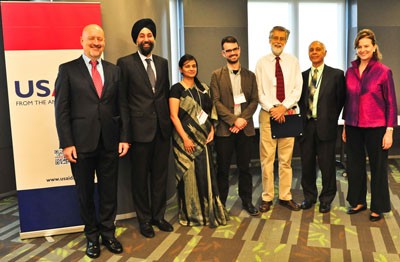
For Immediate Release
BANGKOK, October 15, 2014 – Three Urban Resilience Competition winners today showcased their ideas on building resilient cities that can withstand the negative effects of climate change and rapid urbanization. The U.S. Agency for International Development (USAID), United Nations Development Programme, United Nations Habitat and United Nations Global Pulse commended these projects at a two-day Asia Urban Futures Workshop.
“All three competition winners offer solutions that have the potential to transform an increasingly urban Asia,” said Manpreet Anand, Deputy Assistant Administrator of USAID’s Asia Bureau. “They demonstrate innovative and sustainable ways to build resilience that engage the whole community.”
The International Centre for Environmental Management (ICEM), Solo Kota Kita, and Mahila Housing DEWA Trust all address critical issues facing urban Asia: disaster vulnerability, poor infrastructure and urban planning, and water and sanitation services. The winners were invited to present their work at the two-day conference.
ICEM introduced “Green Infrastructure as a Foundation for Resilience in Mekong Towns,” which engages key stakeholders in rapidly urbanizing towns in Cambodia, Laos and Vietnam. The project informs community members of the impacts of climate change and the need for adaptation and promotes clean, resilient development in order to reshape urban infrastructure.
Solo Kota Kita’s “Vulnerability Reduction through Participatory Design of the Public Realm in Indonesia” aims to reduce water-related vulnerability in riverfront settlements in Banjarmasin, Indonesia. The project works both at the community level to raise awareness on water-related health and safety problems and at the local government level encouraging city planners to incorporate public input into their development strategies.
Mahila Housing DEWA Trust’s program, “Building the Capacities of Slum Women to use Global Positioning Systems (GPS) for Democratic Urban Planning Systems,” is based in Ahmedabad, Gujarat, India and focuses on improving city services like sanitation, storm water drainage and water supply. The project will train communities to use GPS technology to identify service coverage gaps and report problems. By using GPS technology to track services, vulnerable community members in urban slums have direct, scientific and verifiable input into the city development and planning process.
The workshop brought together technology leaders with development professionals and city planners to integrate urbanization with development solutions. Experts explored how to best use futures analysis and scenario planning to the major challenges and opportunities facing a rapidly urbanizing Asia.
“By bringing a group of development thinkers together with innovative local practitioners, we hoped to spark conversations and facilitate collaborations that can potentially lead to transformative bottom-up and innovative solutions to address the complex development challenges we are facing in Asian cities,” said Nicholas Rosellini, UNDP’s Deputy Regional Director for Asia and the Pacific.
The winners of the Urban Resilience Competition illustrate that there is no one way to build urban resilience in Asia, but that the road to success must directly engage those whose lives and livelihoods are impacted by growing urbanization and the challenges of climate change. If scaled up, new tools and new approaches – like those used in the winning projects – could benefit millions by improving urban infrastructure and service delivery, ultimately reducing urban poverty.
See more photos from the Asia Urban Futures Workshop here: https://flic.kr/s/aHsk5o2dGB







Comment
Make a general inquiry or suggest an improvement.